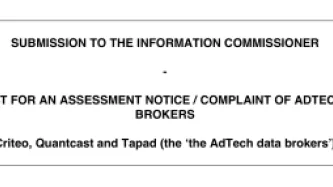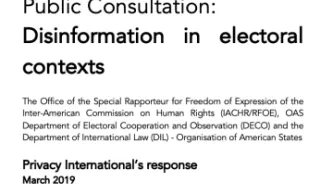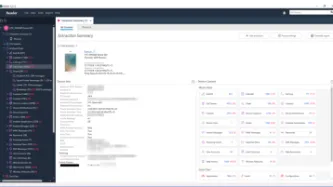Advanced Search
Content Type: Long Read
Image Source: "Voting Key" by CreditDebitPro is licensed under CC BY 2.0
Democratic society is under threat from a range of players exploiting our data in ways which are often hidden and unaccountable. These actors are manifold: traditional political parties (from the whole political spectrum), organisations or individuals pushing particular political agendas, foreign actors aiming at interfering with national democratic processes, and the industries that provide products that …
Content Type: Long Read
Imagine that every time you want to attend a march, religious event, political meeting, protest, or public rally, you must share deeply personal information with police and intelligence agencies, even when they have no reason to suspect you of wrongdoing.
First, you need to go to the police to register; have your photo taken for a biometric database; share the contacts of your family, friends, and colleagues; disclose your finances, health records, lifestyle choices, relationship status, and…
Content Type: Examples
The New York Times picked 16 categories (like registered Democrats or people trying to lose weight) and targeted ads at people in them. They used the ads to reveal the invisible information itself, noting that it is a "story of how our information is used not just to target us but to manipulate others for economic and political ends — invisibly, and in ways that are difficult to scrutinize or even question."
The article illustrates that even though data providers don’t…
Content Type: News & Analysis
The first half of 2018 saw two major privacy moments: in March, the Facebook/ Cambridge Analytica scandal broke, followed in May by the EU General Data Protection Regulation ("GDPR") taking effect. The Cambridge Analytica scandal, as it has become known, grabbed the attention and outrage of the media, the public, parliamentarians and regulators around the world - demonstrating that yes, people do care about violations of their privacy and abuse of power. This scandal has been one of…
Content Type: Advocacy
Consultation Submission
In March 2019, Privacy International submitted a response to a consultation on Disinformation in Electoral Contexts, led by the Office of the Special Rapporteur for Freedom of Expression of the Inter-American Commission on Human Rights together with the Department of Electoral Cooperation and Observation (DECO) and the Department of International Law (DIL) of the Organisation of American States (OAS).
In our submission we highlighted the importance of minmising data…
Content Type: Examples
In the lead up to the 2017 German federal election (Bundestagswahl), all political parties used social media like Facebook, Twitter, Instagram, YouTube, and e-mails as platforms to reach voters.
The far-right Alternative for Germany party (AfD) reportedly hired a Texas-based company for their campaign. Harris Media is known for their work with Republican, far-right and nationalist candidates in the US and worldwide. In 2017, Privacy International revealed that Harris Media was behind the…
Content Type: Examples
In the lead up to the German elections, the conservative Christian Democratic Union (CDU) created a mobile app, Connect 17, which was designed to create a feedback loop between party headquarters and door-to-door volunteers (also known as canvassers).
The app drew on data from the federal statistics office and polling agencies. It let canvassers decide routes, record whether anyone was home, and whether a conversation had been successful. It also allowed canvassers to compare their…
Content Type: Examples
The Sunday edition of the national newspaper Bild reported that Chancellor Angela Merkel's conservative Christian Democrats (CDU) party and the centre-right Free Democrats (FDP) party purchased "more than a billion" pieces of personal data about potential voters from a subsidiary of Deutsche Post, which offered target-mailing concepts to its clients. The Deutsche Post subsidiary, Deutsche Post Direkt, rejected these claims.
Instead, Deutsche Post is reported as insisting that it never…
Content Type: Examples
According to research conducted by Ronan Chardonneau, a French associate professor of digital marketing at Angers University, none of the websites of the eleven candidates' in the 2017 French presidential elections, that he looked into respected CNIL's directives regarding information that should be available on the website and consent requirements for data collection. According to this research, nine of the candidates used Google Analytics, without activating the option to anonymize data…
Content Type: Examples
Before and after the Italian election on 4 March 2018, concerns were raised about the spread of misinformation, disinformation and inflammatory content through a network of news sites and Facebook pages.
In November 2017, in the run up to the election, Buzzfeed reported on links between a large network of Italian news websites (175 domain names) and Facebook pages owned by a media network company Web365 – that represents one of the most popular alternative media operations in Italy including…
Content Type: Examples
In an experiment conducted by Fabio Chiusi and Claudio Agosti during the 2018 election season and set out in detail in their report for Tactical Tech, the duo sought to investigate the Facebook algorithm that powers users’ news feed and the algorithm’s treatment of political content. One of the experiment’s goals was to observe how perception of reality is algorithmically shaped in the context of an electoral campaign. In order to do this, Chiusi and Agosti created six bot accounts on Facebook…
Content Type: Examples
The Five Star Movement, a populist party, which is currently in power along with the League in Italy initially grew out of Il Blog delle Stelle (formerly Beppe Grillo’s blog). The Five Star Movement was founded by comedian Beppe Grillo, along with Gianroberto Casaleggio, a web strategist in 2009. As well as the blog and The Five Star Movement’s heavy use of social media, it consults its supporters on candidates, policies and partnerships via a software system/ internet platform…
Content Type: Examples
A company called Liegey Muller Pons (LMP) offers data analysis tools to help candidates and political parties improve their political campaign strategy. The three founders of the company were member's of former President François Hollande's 2012 campaign team. LMP was then hired by current President Emmanuel Macron during his Grande Marche campaign before the elections and during the presidential elections by the Socialist Party candidate Benoît Hamon. LMP offers data analysis that allows…
Content Type: Examples
NationBuilder is an American political campaigning software company, which offers a fully integrated suite of tools for the organization of a campaign, and outreach through e-mail, telephone, social media, and traditional door-to-door campaigning. Many candidates in the 2017 French presidential elections were reported as using their services. Among others, the company offers a functionality called 'match'. When users provide their email address on a campaign's website, 'match' allows the…
Content Type: News & Analysis
A mobile device is a huge repository of sensitive data, which could provide a wealth of information about its owner and many others with whom the user interacts.
Companies like Cellebrite, MSAB and Oxygen Forensics sell software and hardware to law enforcement. Once your phone is connected to one of these mobile phone extraction tools, the device extracts, analyses and presents the data contained on the phone.
What data these tools can extract and what method is used will…
Content Type: Examples
During the primary elections in November 2016, the former French president, Nicolas Sarkozy, reportedly used an app, called Knockin, that made it possible to identify and geolocate supporters for door-to-door campaigning. Based on a report by the French Radio RMC, the app would harvest public data about anyone that liked a page or a post that the candidate put on his campaign page in order to find the supporter's address. Door-to-door volunteers were then able to see on the app the address…
Content Type: Advocacy
In December 2018, PI responded to the UK Information Commissioner's (ICO) Call for Views on a Code of Practice for the use of personal information in political campaigns.
The consultation followed on from the ICO's policy report Democracy Disrupted?, published in July 2018, which recommended that the Government should legislate at the earliest opportunity to introduce a statutory Code of Practice under the Data Protection Act 2018 for the use of personal information in campaigns.…
Content Type: News & Analysis
This piece was first published in GDPR today in March 2019.
Elections, referendums and political campaigns around the world are becoming ever more sophisticated data operations. This raises questions about the political use and abuse of personal data. With the European Union elections fast approaching and numerous national and local elections taking place across EU Member States, it is essential that the legal frameworks intended to protect our personal data do just that.
Member State…
Content Type: Advocacy
This week a public debate on facial recognition will take place in Westminster Hall.
Following a public request for comment by Darren Jones MP (Science and Technology Committee), we sent our responses to the questions asked.
Below you can find the integral content of our letter.
1. Would you consent to the police scanning your face in a crowd to check you’re not a criminal?
Facial recognition technology uses cameras with software to match live footage of people in public with…
Content Type: Landing Page
Our relationships with our governments are increasingly mediated by technology. Whether we are viewing election advertisements on Facebook, expressing our dissent on Twitter, chatting about our political views or sharing a video on Whatsapp, voting electronically, or attending a protest that is being monitored by cameras equipped with facial recognition software, technology is now infused into the political process.
The seamless way we communicate using some of these technologies has helped…
Content Type: Explainer
It’s tough to minimise targeted ads on phones because ads can be delivered based on data from the device level (such as what operating system your phone is using or based on unique numbers that identify your phone), browser level (what you search for within a browser), and within the apps you use. An app could target ads at you based on your location (tied to your unique device id number(s)) for example. Apps, including Instagram, direct you to opt-out of targeted ads at the device level.…
Content Type: News & Analysis
Photo by DAVID ILIFF. License: CC-BY-SA 3.0
Between 23 and 26 May 2019 Europeans will be voting to elect members of the European Parliament.
Since the last elections in 2014, much has changed within and without the European Union: the rise of nationalism and Euroscepticism, the protracted armed conflict in Ukraine and the occupation of Crimea by Russia, the new political orientation of the United States, just to name a few.
Among the new challenges facing these elections is…
Content Type: Video
In April 2019 Ukraine held presidential elections. We were in Kyiv to hear about people's experience monitoring online disinformation – a big issue in this election. Activists in Ukraine have long experience navigating the noisy and chaotic environment that disinformation creates – which comes not only from Russia, but also from domestic politicians and others with money and power.
At PI, we’re working to make sure that the way data is used by political actors and…
Content Type: Long Read
“Truth exists, but you have to find it”, Oleksandra Matviychuk of Ukraine’s Center for Civil Liberties told me as I interviewed her in central Kyiv one week before the 2019 Ukrainian run-off election, “and in order to do so you have to make some effort”. We’re talking about her experience working on the ground in Ukraine, a country with a long history of battling against disinformation.
Activists in Ukraine have long experience navigating the noisy and chaotic environment that disinformation…




























